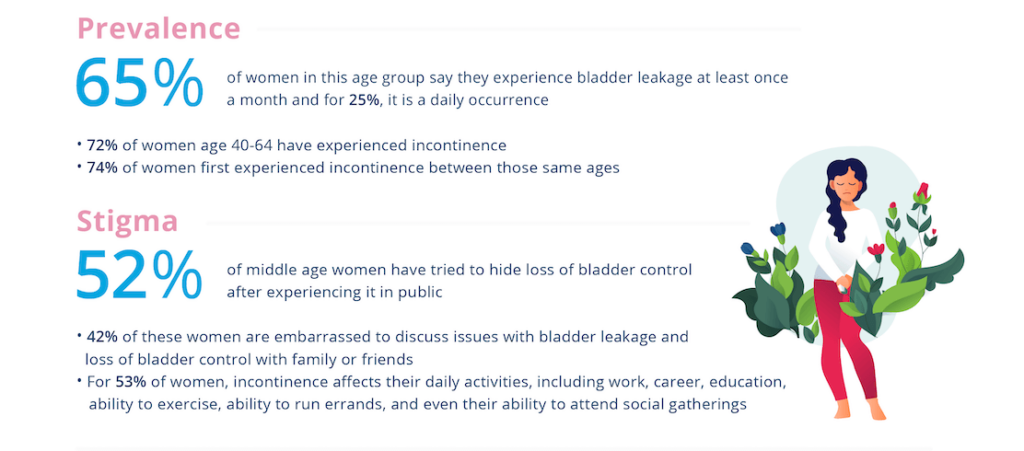Recently, Aeroflow Urology, a national provider of continence care supplies through insurance, surveyed hundreds of women, aged 40-64, to learn more about their journey with incontinence. The results were astonishing.
The poll showed us that while almost ¾ of middle age women are affected by incontinence, there is a large gap in education and resources available to these women as they navigate these changes to their body without help or guidance from their healthcare provider.
Incontinence In Middle Age Women, By The Numbers:
Prevalence
- Incontinence is very common among women aged 40-64, with 72% having experienced it and 74% of women first experiencing incontinence between those same ages.
- 65% say they experience bladder leakage at least once a month and for 25% of women, it is a daily occurrence.

Stigma
- 52% of middle age women have tried to hide loss of bladder control after experiencing it in public, while another 42% are embarrassed to discuss it with family or friends, suggesting the presence of a strong stigma.
- For over half ( 53%) of women, incontinence affects their daily lives and activities, including work, career, education, ability to exercise, ability to run errands, and even their ability to attend social gatherings.
Barriers To Treatment And Education
- 56% did not visit a doctor after experiencing loss of bladder control, and 37% said they did not seek treatment because they did not think it was a big deal, illustrating a lack of education on incontinence.

“This study confirms what we already suspected: that social stigma and a lack of education about incontinence stand in the way of treatment,” said Aleece Fosnight, Medical Advisor for Aeroflow Urology. “Breaking down those barriers is such an important step in preventative treatment and normalizing incontinence. Without proper treatment, incontinence can snowball into larger health issues such as urinary tract infections, kidney failure, and depression, and can even impact life issues like personal finance.”
Aeroflow Urology is working to be a resource to people of all ages and genders when it comes to living with incontinence. Their mission is not only to educate and bring awareness to incontinence and bladder control, but also to help ease the financial burden of purchasing these needed supplies.
As a provider of continence care supplies through insurance, Aeroflow Urology, helps individuals across the country maximize their insurance benefits to receive high quality supplies at no cost. Their team takes the hassle out of your hands by working directly with insurance and healthcare providers to complete and submit all required paperwork to ensure there is no cost to you.
When working with Aeroflow, you also receive a dedicated and specially trained Continence Care Specialist who will be available to you throughout your continence journey. From sending product samples to troubleshooting issues, the team at Aeroflow Urology makes it easy to get the products you need at no cost through your insurance plan.
Qualifying is quick and simple – all you’ll need is your insurance card. To get started, simply submit your information through their qualification form. Once received, their team will contact you within 1-2 business days to get started.
Join Aeroflow Urology as they work to break the stigma of incontinence through meaningful conversations, educational resources and shared stories. You can follow along and share your story on social media using #incontinenceawareness. Download the Poster with stats from this survey here!






